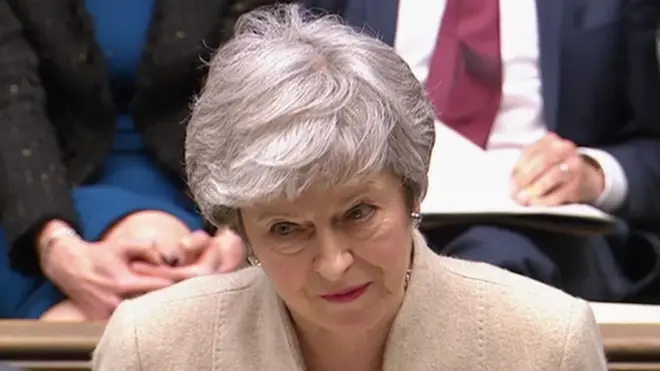
Simon Marks 3pm - 7pm
29 March 2019, 16:44 | Updated: 29 March 2019, 16:50
After MPs rejected Theresa May's EU Withdrawal Agreement by a margin of 58 votes, LBC’s political editor Theo Usherwood looks at the four options left for Brexit.
In another dramatic day in the House of Commons, MPs voted by 344 to 286 against the deal.
Some 34 Conservative rebels ignored a last-ditch plea from the Prime Minister to take the “last opportunity to guarantee Brexit”.
The result means the UK will now miss the EU’s deadline to secure an extension of the Brexit process and leave with a deal on May 22nd.
Mrs May now has until the 12th April to come up with an alternative plan.
These are the four most likely options available to her:

On Monday, MPs will take part in another round of indicative votes.
The last time it was held MPs were unable to agree on a majority on eight alternative options.
But, Ken Clarke's proposal for a Customs Union came closest to reaching a consensus in the Commons.
It could get the numbers if it's put to a vote against next week.
Pro-Brexit MPs are against a Customs Union because it would prevent the UK signing its own free trade deals.
Although MPs have repeatedly voted against a no-deal Brexit, the default option still remains for Britain to leave the EU on April 12th - unless leaders from the remaining 27 countries agree otherwise.
The UK Government has until then to come up with an alternative plan to secure another extension.
After Friday's vote, the European Commission said it was a "likely scenario".
Margaret Beckett’s proposal for a second referendum on any deal reached with the EU got the most support from MPs.
268 voted for it while 295 voted against it during the indicative votes.
But, the Prime Minister has repeatedly said she is against another referendum.
The EU has repeatedly said it will only grant a lengthy extension if the UK has plan for something else.
The Prime Minister could use that time to hold a general election in a bid to break the impasse.
But, critics warn it would amount to the same deadlock.